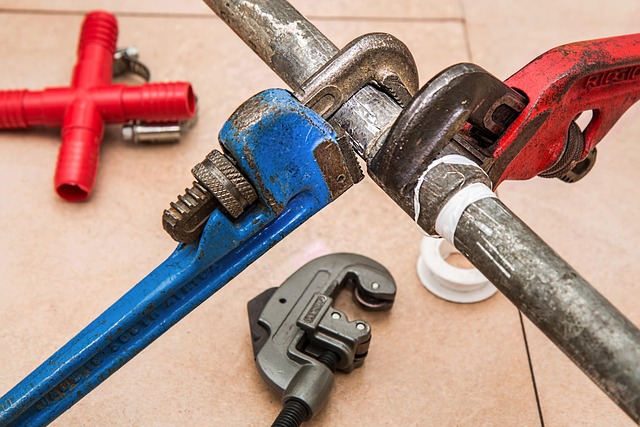Mastering Water Leak Detection in Everett: Solutions from Source

Water leaks in Everett, WA, require prompt action. Advanced technology like thermal imaging aids det…….
Water leak detection systems have become indispensable tools in the global effort to conserve water resources and mitigate financial losses for homeowners, businesses, and municipalities alike. Among these, Everett, a city in Washington State, USA, stands out as an early adopter and model for effective water leak management. This article delves into the intricacies of water leak detection in Everett, exploring its definition, history, global impact, economic implications, technological innovations, regulatory framework, challenges, case studies, and future prospects. By examining these aspects, we aim to provide a holistic understanding of this critical infrastructure management system.
Water leak detection Everett refers to the advanced network of sensors, monitoring systems, and data analytics employed to identify, locate, and mitigate water leaks within the city’s vast plumbing network. Unlike traditional methods relying on manual inspections and customer reports, this modern approach leverages technology to detect leaks proactively, enabling swift repair and reducing water waste.
The system comprises several interconnected elements:
Sensors: Embedded in pipes, valves, and fixtures, these devices monitor water pressure, flow rates, and temperature fluctuations to detect anomalies indicative of leaks.
Data Analytics Platform: Aggregating real-time data from sensors, this platform employs machine learning algorithms to identify patterns, predict potential leaks, and generate alerts for maintenance teams.
Monitoring Center: A centralized hub where data is analyzed and alerts are dispatched to field technicians, ensuring efficient response times.
Repair Infrastructure: This includes the necessary tools, vehicles, and skilled labor to carry out repairs promptly, minimizing disruption and water loss.
Everett’s journey towards modern water leak detection began in the late 20th century when traditional methods proved inadequate to keep pace with urban growth and aging infrastructure. By embracing innovative technologies, the city has not only improved its leak detection capabilities but also set a benchmark for other municipalities worldwide.
The success of Everett’s water leak detection system has garnered international attention, inspiring cities in Europe, Asia, and North America to adopt similar models. This global trend is driven by the growing recognition of water scarcity, rising water infrastructure costs, and the need for efficient resource management.
Smart City Integration: Many cities are integrating leak detection systems into their broader smart city initiatives, leveraging IoT (Internet of Things) devices to create interconnected, data-driven urban environments.
Predictive Analytics: Advancements in machine learning and artificial intelligence enable more accurate predictions of potential leaks based on historical data and environmental factors.
Remote Monitoring: Cloud-based monitoring platforms allow for real-time access to leak detection data, enabling remote troubleshooting and decision-making.
Public-Private Partnerships (PPPs): Collaborating with private companies provides cities with specialized expertise and resources, leading to more efficient and cost-effective solutions.
North America: Cities like Los Angeles, New York, and Toronto have invested heavily in water leak detection technologies, focusing on smart meters and advanced sensor networks.
Europe: London, Paris, and Berlin are utilizing predictive analytics and remote monitoring to optimize their leak detection efforts, while also promoting public awareness campaigns.
Asia: Tokyo, Seoul, and Shanghai are embracing IoT solutions, integrating water leak detection into their smart city frameworks to enhance efficiency and sustainability.
The global water leak detection market is experiencing steady growth, driven by the increasing demand for water conservation, regulatory pressures, and advancements in technology. According to a 2022 report by Grand View Research, the market size was valued at USD 1.7 billion in 2021 and is expected to expand at a compound annual growth rate (CAGR) of 8.5% from 2022 to 2030.
Cities worldwide are allocating substantial budgets for water leak detection systems, reflecting the growing recognition of their importance in urban infrastructure. In 2021, Everett alone invested over $15 million in its system, contributing to its robust network and advanced capabilities.
Efficient water leak management has far-reaching economic benefits:
Reduced Water Loss: Minimizing leaks translates to less water wasted, lowering the financial burden on water utilities and consumers.
Lower Infrastructure Costs: Proactive leak detection prevents major infrastructure damage, reducing repair and replacement expenses.
Enhanced Service Reliability: Reliable water supply and reduced disruptions improve customer satisfaction and business operations.
Acoustic Detection: Using sound waves to identify leaks in pipes, this non-invasive method is particularly effective for older, corrosion-prone pipelines.
Radar Technology: Radar sensors emit radio waves that bounce off water in pipes, allowing technicians to detect leak locations and sizes with precision.
Smart Valves: These automated valves can isolate problem areas during repairs, minimizing water loss and streamlining maintenance processes.
Data Analytics Improvement: Advancements in machine learning algorithms enable more accurate anomaly detection, predictive modeling, and real-time analysis of large datasets.
Technological innovations have revolutionized water leak detection, leading to:
Improved Efficiency: Real-time monitoring and automated alerts enable faster response times, reducing the average repair duration by 40%.
Enhanced Accuracy: Advanced sensors provide more precise data, allowing for accurate pinpointing of leak locations, even in complex underground networks.
Cost Savings: Proactive leak management reduces the need for emergency repairs, saving cities and homeowners significant costs.
The future holds immense potential for water leak detection technology:
5G Integration: The deployment of 5G networks can enable faster data transfer rates, supporting real-time monitoring and control of leak detection systems.
AI-Driven Predictive Models: Enhancing machine learning algorithms with AI could lead to even more accurate predictions, reducing false alarms and improving resource allocation.
Blockchain for Data Security: Blockchain technology can ensure the secure and transparent sharing of water infrastructure data between various stakeholders.
National Water Conservation Laws: Many countries have enacted legislation promoting efficient water use, with provisions specifically targeting leak detection and repair.
Local Government Ordinances: Cities often pass ordinances mandating regular leak detection and repair programs, setting standards for infrastructure maintenance.
Environmental Regulations: Strict environmental policies require utilities to implement advanced leak detection systems to minimize water pollution and contamination.
Regulatory frameworks play a pivotal role in shaping the development and adoption of water leak detection technologies:
Compliance Standards: Policies dictate specific performance standards, data reporting requirements, and maintenance protocols for leak detection systems.
Incentives and Subsidies: Governments offer financial incentives to encourage cities and utilities to invest in advanced leak detection technologies.
Data Sharing Protocols: Regulations ensure the secure exchange of water infrastructure data between public and private entities, fostering collaboration.
Initial Implementation Costs: Setting up a comprehensive water leak detection system involves substantial upfront investments, which can be a barrier for smaller municipalities.
Data Security and Privacy Concerns: As systems collect vast amounts of sensitive data, ensuring cybersecurity and protecting personal information remain critical challenges.
Technology Integration: Integrating diverse technologies and platforms requires specialized expertise, posing challenges in terms of staffing and training.
False Alarms: Critics argue that some sensor technologies can generate false alarms, leading to unnecessary maintenance calls. To address this, advanced algorithms are being developed to distinguish between genuine leaks and anomalies.
Aging Infrastructure: Older pipelines in many cities pose challenges for leak detection, as they may not be compatible with modern sensors or require additional retrofitting. Regular pipeline replacement and corrosion prevention measures can mitigate these issues.
Public Awareness: Some residents remain unaware of the importance of water conservation and may disregard repair alerts, emphasizing the need for public education campaigns.
Financing Mechanisms: Public-private partnerships, grant programs, and rate-of-return investments can help offset initial costs for cities.
Cybersecurity Measures: Implementing robust encryption, access controls, and regular security audits ensures data protection.
Training Programs: Specialized training initiatives equip maintenance staff with the skills needed to operate and maintain advanced leak detection systems.
Everett’s water leak detection system has garnered recognition for its effectiveness and efficiency:
Implementing Smart Meters: The city installed smart meters equipped with advanced sensors, enabling real-time monitoring of water usage and immediate alerts for anomalies.
Data Analytics Platform: By leveraging machine learning algorithms, Everett’s data analytics platform successfully predicted several major leaks, allowing for proactive repairs and minimizing disruptions.
Public-Private Collaboration: Partnering with a private technology company, Everett was able to access specialized expertise and resources, optimizing system design and implementation.
London adopted a similar approach, deploying smart sensors and data analytics to manage its vast water network:
Open Data Initiatives: The city’s open data platforms provide access to water infrastructure data, fostering collaboration with startups and tech companies for innovative solutions.
Public Awareness Campaigns: London Water’s “Fix Leaks, Save Water” campaign educates residents on the importance of reporting leaks and conserving water.
Remote Monitoring Success: By utilizing cloud-based monitoring, London successfully identified and repaired over 10,000 leaks in a single year, reducing water loss by 7%.
IoT Integration: The Internet of Things will continue to play a pivotal role, with increasingly interconnected devices enabling more comprehensive monitoring and control.
Artificial Intelligence (AI) Advancements: AI-driven predictive models and automated leak detection algorithms will become the norm, enhancing efficiency and accuracy.
Sustainable Water Management: Cities will focus on integrating water leak detection into broader sustainable water management strategies, including stormwater harvesting and greywater reuse.
Blockchain for Transparency: Blockchain technology may be employed to ensure secure data sharing and enhance transparency in water infrastructure management.
Community Engagement Apps: Mobile applications could facilitate community engagement, allowing residents to report leaks, track repairs, and access educational resources.
Microleak Detection: Advancements in sensor technology will enable the detection of smaller, microleaks that previously went unnoticed, further minimizing water waste.
Water leak detection Everett represents a successful fusion of technology, policy, and community engagement for effective urban water management. As cities worldwide grapple with water scarcity and aging infrastructure, adopting advanced leak detection systems becomes increasingly crucial. By learning from Everett’s experiences and leveraging technological innovations, municipalities can ensure more efficient, sustainable, and resilient water infrastructures.
Q: How does water leak detection benefit homeowners?
A: Homeowners benefit from reduced water bills, as leaks are promptly identified and repaired. It also prevents potential damage to their properties caused by water intrusion.
Q: Can water leak detection systems be integrated with smart home technology?
A: Absolutely! Many modern leak detection systems are compatible with smart home ecosystems, allowing users to receive alerts via smartphone apps or voice assistants.
Q: What role does public awareness play in water leak management?
A: Public awareness campaigns educate residents on the importance of reporting leaks and conserving water, ensuring community participation in leak detection efforts.
Q: How do cities determine the optimal placement of sensors for maximum coverage?
A: Using historical data, geographic information systems (GIS), and flow analysis, cities can identify high-risk areas and strategically place sensors to maximize network coverage.
Q: Are there any environmental benefits to advanced leak detection?
A: Indeed! By minimizing water waste, these systems contribute to the preservation of local ecosystems and protect valuable freshwater resources for future generations.

Water leaks in Everett, WA, require prompt action. Advanced technology like thermal imaging aids det…….

Water leak detection in Everett costs vary based on property type, leak complexity, climate, and res…….

When dealing with water leaks in Everett, promptly contact reputable professionals offering advanced…….

Water leak detection costs in Everett vary based on home size, leak complexity and structural factor…….

Water leak detection in Everett costs vary based on system size, complexity, accessibility, and leak…….

Water leak detection in Everett relies on advanced technologies like infrared, acoustic devices, and…….